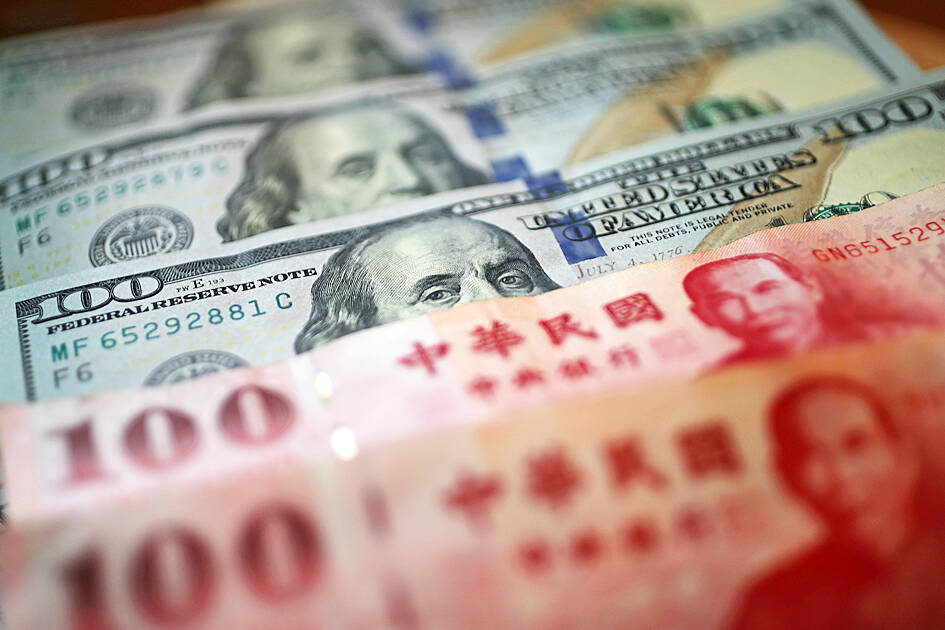In the wake of higher-than-expected inflation data in the US, the US dollar continued to appreciate against the New Taiwan dollar yesterday, breaching the NT$31 mark and reaching its highest level in three years.
After opening at NT$30.990, the day’s low, and moving to a high of NT$31.156, the greenback closed up NT$0.198 against the NT dollar at NT$31.088, the highest since Sept. 11, 2019, when it closed at NT$31.220.
The US dollar received a boost on the market’s opening following reports that the US consumer price index (CPI) rose 8.3 percent last month from a year earlier, beating market expectations of an 8.1 percent rise, while core CPI grew 6.3 percent compared with an estimate of 6.1 percent, dealers said.

Photo: CNA
With the disappointing data, investors expect the US Federal Reserve to continue its aggressive rate hike cycle to combat inflation.
The US dollar steamed ahead as the local equity market plunged and investors sold the NT dollar, lifting the greenback past NT$31.
The NT dollar is expected to consolidate between NT$30.800 and NT$31.200 over the next few sessions, before the Fed wraps up its two-day policymaking meeting on Wednesday next week, when there would be more clues about its attitude, dealers said.

The Eurovision Song Contest has seen a surge in punter interest at the bookmakers, becoming a major betting event, experts said ahead of last night’s giant glamfest in Basel. “Eurovision has quietly become one of the biggest betting events of the year,” said Tomi Huttunen, senior manager of the Online Computer Finland (OCS) betting and casino platform. Betting sites have long been used to gauge which way voters might be leaning ahead of the world’s biggest televised live music event. However, bookmakers highlight a huge increase in engagement in recent years — and this year in particular. “We’ve already passed 2023’s total activity and

Nvidia Corp CEO Jensen Huang (黃仁勳) today announced that his company has selected "Beitou Shilin" in Taipei for its new Taiwan office, called Nvidia Constellation, putting an end to months of speculation. Industry sources have said that the tech giant has been eyeing the Beitou Shilin Science Park as the site of its new overseas headquarters, and speculated that the new headquarters would be built on two plots of land designated as "T17" and "T18," which span 3.89 hectares in the park. "I think it's time for us to reveal one of the largest products we've ever built," Huang said near the

China yesterday announced anti-dumping duties as high as 74.9 percent on imports of polyoxymethylene (POM) copolymers, a type of engineering plastic, from Taiwan, the US, the EU and Japan. The Chinese Ministry of Commerce’s findings conclude a probe launched in May last year, shortly after the US sharply increased tariffs on Chinese electric vehicles, computer chips and other imports. POM copolymers can partially replace metals such as copper and zinc, and have various applications, including in auto parts, electronics and medical equipment, the Chinese ministry has said. In January, it said initial investigations had determined that dumping was taking place, and implemented preliminary

CUSTOMERS’ BURDEN: TSMC already has operations in the US and is a foundry, so any tariff increase would mostly affect US customers, not the company, the minister said Taiwanese manufacturers are “not afraid” of US tariffs, but are concerned about being affected more heavily than regional economic competitors Japan and South Korea, Minister of Economic Affairs J.W. Kuo (郭智輝) said. “Taiwan has many advantages that other countries do not have, the most notable of which is its semiconductor ecosystem,” Kuo said. The US “must rely on Taiwan” to boost its microchip manufacturing capacities, Kuo said in an interview ahead of his one-year anniversary in office tomorrow. Taiwan has submitted a position paper under Section 232 of the US Trade Expansion Act to explain the “complementary relationship” between Taiwan and the US